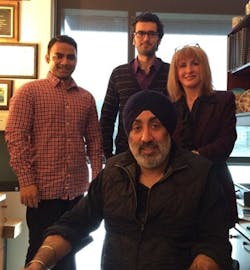An Rx for the pains in your assets
In January, asset performance management software provider Meridium announced a partnership with the University of Tennessee to, in Merdium’s words, “enhance research and development in reliability and maintenance engineering.” What that translates into is creating smarter data analysis models to help companies figure out where to focus their maintenance and asset management efforts. A team led by Rupy Sawhney, Ph.D., Executive Director, The Center for Advanced Systems Research and Education, professor and Heath Fellow in Business and Engineering in the industrial and systems engineering department at UT, is heading up the effort for the university.
PS: Can you elaborate on the goals of your project?
RS: Our initial discussions with Meridium started out by asking, what if we could get asset data ... and be able to build some kind of logic that identifies and prioritizes which problem is more important, which asset is more important, what are the processes going to look like, so that based on just the asset information, you can manage the asset.
Based on the accumulation of multiple assets, if we know the structures and what they look like, it is possible that you can make decisions far better than just on the asset. These decisions would extend into the well-being of the production process.
We have been very narrow-minded in how we analyze processes. Everything in asset management is (about) availability. Everything from production is efficiency. But what about reliability? Efficiency and reliability are two components that we believe have to go together to understand and analyze the system.
PS: Companies are collecting more asset data than ever. How is this not translating into more-effective, more-efficient asset management?
RS: Not everybody that screams in your house has something to say. Which ones do you ignore, and which ones do you actually listen to?
Right now, asset management is telling you, “Hey, focus on all of these,” and production is telling you something different. Over a period of time, there has to be a tool that allows these two to bridge and to talk to each other.
Clockwise from front: Dr. Rupy Sawhney; Dhanush Agara Mallesh, Graduate Research Assistant; Vahid Ganji Lisar, Graduate Research Assistant; Carla Angelo-Arbogast, Director, Special Projects and Programs, Center for Advanced Systems Research and Education, UT Industrial and Systems Engineering Dept.
PS: What implications can better-prioritized maintenance and improved interdepartmental collaboration have for companies? What’s the challenge for you in conveying those?
RS: This project requires data cleaning, but at the same time, once the data is clean, we need to transform this data into information in order to manage and grow business. I want to manage an asset from the end result of creating greater revenue for the organization. If I manage an asset and it doesn’t really add additional revenue into the company, then the question is, why are we doing this?
We know that there’s a connection between asset management and the overall profitability of the company. But when I try to go sell that, I have to make the first connection and the second connection and the third connection, and hopefully somebody’s following and agreeing with these connections (and seeing), “What if we could actually connect asset management to the overall well-being of an organization through something like this?
That’s exactly it. That’s really the overall goal of this.
PS: As you see it, with tools like these, you stay agile enough to respond to business and strategy changes.
RS: It will help companies understand what data to collect. How to be able to manage their data. How to develop their performance measurement systems to be able to link all of these different categories together. It is a better integration of your organization. I want to learn from industry. I want to know what their programs are, do the necessary research, and turn around and give industry what we think it needs.
[sidebar id="4"]



